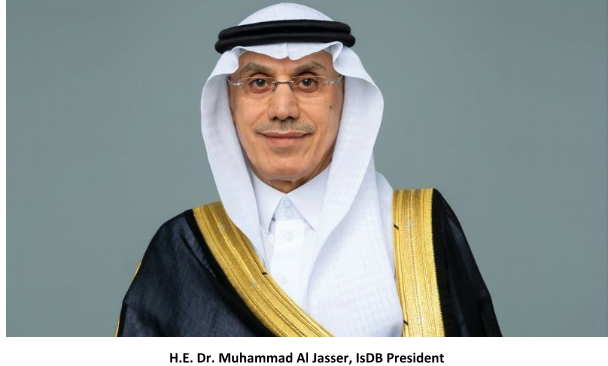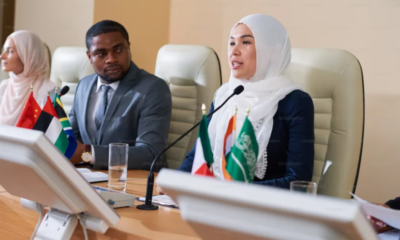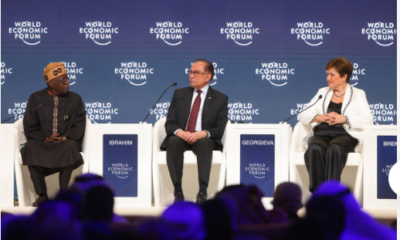BUSINESS & ECONOMY
Legitimizing Crypto in Indonesia: A Game-Changer for Global Finance
Published
10 months agoon
By
Editor
By Tuhu Nugraha
As one of the countries with the largest populations in the world, Indonesia has reached a significant milestone in the history of global financial technology. Indonesia has 17,4 Million Crypto investors by May 2023. The country recently inaugurated its first crypto exchange, giving recognition and legitimacy to digital currencies as a legitimate investment instrument. This constitutes the first crypto exchange in the world. This move also reaffirms Indonesia’s position as a significant player in the global crypto ecosystem.
This initiative was taken by the Commodity Futures Trading Regulatory Agency (Bappebti) of Indonesia, with the primary aim of providing legal certainty and protection for investors. Furthermore, with the existence of exchanges, clearing, and asset storage managers, public accessibility to crypto assets is expected to increase, ensuring security and comfort for its users.
The crypto exchange provides numerous new opportunities for both investors and the government. For investors, legal certainty paves the way for increased participation in the crypto ecosystem. Meanwhile, for the government, this recognition provides access to apply tax rules on crypto transactions, which is expected to boost state revenue from this new sector.
Even though crypto possesses a decentralized and anonymous nature, this does not mean that crypto transactions cannot be regulated or taxed. The government still has the capacity to supervise and regulate crypto exchanges, including decentralized exchanges (DEXs).
With this step, Indonesia has made history and opened the door for other countries to follow in its footsteps. The crypto community in Indonesia hopes that this recognition can strengthen Indonesia’s position as a trading center and innovator of digital currencies in Southeast Asia or ASEAN.
While there are many benefits, the challenges on this journey cannot be ignored. One of the main challenges is how the government can ensure that investors, especially those less experienced, are protected from volatile market risks. Public education about how to invest wisely in crypto, transparency and accountability from all parties involved in this ecosystem, are key factors in ensuring the healthy and sustainable growth of the crypto market.
In the future, the government needs to continue to strive to strengthen infrastructure and regulations around crypto. Adequate knowledge about the risks and benefits of crypto investment also needs to be conveyed to the public. In addition, the government must pursue international cooperation in the formation of global standards and a framework for crypto regulation.
Indonesia has shown initiative and vision in embracing this new technology. This marks the beginning of a new era in the digital economy, where Indonesia is not only a crypto trading hub in Southeast Asia but also a center of innovation and growth for the global crypto industry. As a country that now has an official crypto exchange, Indonesia also needs to consider various other important aspects. For example, ensuring that this exchange meets good security and governance standards. Building investor trust is key to success in this industry. Therefore, protecting customer personal data and assets is crucial.
It must also be remembered that crypto is not a risk-free investment. High price volatility and other risk factors such as fraud and hacking must be recognized. Therefore, public education on how to invest wisely in crypto is crucial. The public should be given adequate knowledge to make the right investment decisions. The government and educational institutions can hold webinars and online seminars on the basics of crypto investment. Topics that can be discussed include what crypto is, how it works, and the risks and potential returns of crypto investment.
Other things that can be done are organizing practical training and workshops on how to invest in the crypto market. This training can include how to choose a crypto trading platform, how to buy and sell crypto, and how to secure crypto assets. This education can be done collaboratively by Bappeti, OJK, and associations such as Aspakrindo, and exchange companies that have received permission in Indonesia such as Indodax, Binance, Pintu etc.
In addition, through this crypto exchange, the government can also take proactive steps in combating financial crimes related to digital currencies, such as money laundering and terrorism financing. This can be done by implementing strict KYC (Know Your Customer) and AML (Anti-Money Laundering) rules.
It’s important to remember that while regulations can provide a safer and more controlled environment for the use and trade of cryptocurrencies, they also need to be balanced with the freedoms that are intrinsic to the decentralized and open-source nature of blockchain technology. Over-regulation could stifle innovation and the potential economic benefits that cryptocurrencies can provide.
The opening of this crypto exchange is also an opportunity for Indonesia to develop Blockchain technology and other digital currencies. As the technology behind crypto, Blockchain has various applications that can help increase efficiency and transparency in many sectors, such as logistics, agriculture, healthcare, and government.
Indonesia’s blockchain community is indeed flourishing, exhibiting cutting-edge sophistication and rapid growth. Case in point: Batam-based BeOneChain, a trailblazer in the development of Layer 1 blockchain technology. BeOneChain represents a potent solution for emerging nations, demonstrating the tangible impact of this transformative technology.
This November 2023, another leap forward in the blockchain arena is set to emerge from Bali with the launch of Mandala Chain. This Layer 0 blockchain is anticipated to address issues of scalability and interoperability that persist within the realm of blockchain technology.
It’s imperative for the Indonesian government to actively nurture and safeguard these innovative technological ecosystems. To achieve this, the establishment of a supportive regulatory environment is critical. It paves the way for promising ventures like BeOneChain and Mandala Chain, fostering an atmosphere of creativity, progress, and sustainable growth.
Indonesia’s vibrant and forward-thinking blockchain community reflects the nation’s potential as a significant player in the global blockchain landscape. It is through this kind of innovation that Indonesia could position itself at the forefront of digital revolution, ultimately shaping a robust, inclusive, and transparent digital economy.
Indonesia can also take advantage of this momentum to promote research and development in the field of crypto and Blockchain. With government support and collaboration between industry, academia, and community, the country has the potential to become a leader in Blockchain technology and digital currency innovation.
Lastly, it’s important for Indonesia to establish international cooperation in crypto regulation and standards. By doing this, the country can ensure that its regulations align with global best practices, strengthen its reputation in the crypto world, and expand market access for local investors and companies. Most importantly, it will attract large global Crypto Exchange players to enter the Indonesian market, for example, OKX, Kraken.
Looking ahead, the digital era will bring many opportunities and challenges. However, with proper preparation and a balanced approach, Indonesia can leverage crypto and Blockchain technology to create a stronger, more transparent, and inclusive economy. This digital era marks the beginning of an exciting journey, and Indonesia has proven itself ready to embrace the challenges and opportunities on offer.
By Tuhu Nugraha is a Digital Business & Metaverse Expert Principal of Indonesia Applied Economy & Regulatory Network (IADERN)
You may like
-


Red Notice: Putin is Nearby
-


Top 8 Ways Halal Cosmetics Are Reshaping Fashion in 2024
-


Debt Dependency in Africa: the Drivers
-


IsDB President Advocates for Cultivating Entrepreneurial Leaders
-


Sanctity of Hijab Being Undermined by the Liberal Media Globally
-


Davos Really Comes to the Desert as the WEF Arrives in Riyadh
BUSINESS & ECONOMY
ICD and JSC Ziraat Bank Collaborate to Boost Uzbekistan’s Private Sector
Published
18 hours agoon
May 16, 2024By
Editor
At the 3rd Tashkent Investment Forum, the Islamic Corporation for the Development of the Private Sector (ICD) and JSC Ziraat Bank Uzbekistan took a significant step forward in their partnership to empower small and medium-sized enterprises (SMEs) and foster economic growth in Uzbekistan. The forum, held in the capital city of Uzbekistan, brought together key stakeholders from the public and private sectors to discuss investment opportunities and economic development strategies for the region. The collaboration between the Islamic Corporation for the Development of the Private Sector (ICD) and JSC Ziraat Bank Uzbekistan is aimed at boosting the private sector in Uzbekistan.
During the forum, ICD and JSC Ziraat Bank Uzbekistan formalized an expression of intent to collaborate on various initiatives aimed at supporting SMEs. One of the key elements of this collaboration is the provision of a Line of Financing (LoF) facility by ICD to JSC Ziraat Bank Uzbekistan. This LoF facility will enable the bank to fund private sector projects as an agent of ICD, thereby providing SMEs with access to the necessary capital to initiate and grow their businesses.
The partnership between ICD and JSC Ziraat Bank Uzbekistan is expected to have a significant impact on the SME landscape in Uzbekistan. By equipping entrepreneurs with the resources they need to succeed, this collaboration will not only support the growth of individual businesses but also contribute to the overall economic development of the country. SMEs play a crucial role in driving economic growth, creating jobs, and fostering innovation, and this partnership will help strengthen the SME ecosystem in Uzbekistan.
JSC Ziraat Bank Uzbekistan, as a strategic partner for ICD, brings a wealth of experience and expertise to the table. As a prominent commercial bank with foreign capital, JSC Ziraat Bank Uzbekistan has a strong track record of supporting SMEs and promoting economic development. The bank’s partnership with ICD further underscores its commitment to advancing the private sector in Uzbekistan and its dedication to supporting the country’s economic growth.
ICD, for its part, is a leading multilateral development financial institution that focuses on supporting the economic development of its member countries through the provision of finance and advisory services to private sector enterprises. By partnering with JSC Ziraat Bank Uzbekistan, ICD is furthering its mission of promoting economic development and fostering entrepreneurship in Uzbekistan and across the Islamic world.
The LoF facility provided by ICD to JSC Ziraat Bank Uzbekistan is just one example of the many initiatives that the two entities are undertaking to support SMEs in Uzbekistan. In addition to providing financial support, the partnership between ICD and JSC Ziraat Bank Uzbekistan will also include capacity-building initiatives and technical assistance programs to help SMEs succeed in today’s competitive business environment.
Overall, the partnership between ICD and JSC Ziraat Bank Uzbekistan represents a significant step forward in supporting SMEs and fostering economic growth in Uzbekistan. By working together, these two institutions are helping to create a more vibrant and dynamic private sector in Uzbekistan, which will ultimately benefit the country’s economy and its people. The collaboration between the Islamic Corporation for the Development of the Private Sector (ICD) and JSC Ziraat Bank Uzbekistan is expected to have a far-reaching impact on the private sector in Uzbekistan.
BUSINESS & ECONOMY
In Times of Conflict, Spare a Thought for the Non-Gulf Economies
Published
2 weeks agoon
May 6, 2024By
Editor
By James Swanston
Positive news for non-GCC Arab economies has been in short supply of late. The Gaza conflict, missile attacks in the Red Sea, war in Ukraine and last month’s tit-for-tat missile strikes between Israel and Iran have weighed on sentiment, undermined limited confidence and cut into growth.
But some positives have emerged. Headline inflation rates have slowed across much of North Africa and the Levant, implying lower interest rates, a return to real growth and more stable exchange rates. March data show inflation at an annualised rate of just 0.9 percent in Morocco and 1.6 percent in Jordan. Tunisia’s inflation rate has also come down, although it is still running at over 7 percent year on year.
Egypt’s inflation rate jumped earlier this year as the government implemented price hikes to some goods and services – notably fuel. In February, the effect of the devaluation in the pound to the level of the parallel market affected prices. But March’s reading eased to an albeit still high 33 percent year on year.
Elsewhere, Lebanon’s inflation slowed to 70 percent year on year in March, the first time it has been in double – rather than triple – digits since early 2020 due to de-facto dollarisation and lower demand for imports. That said, inflation in these economies is vulnerable to increases in the prices of global foods and energy (such as oil) due to their being net importers. If supply chain disruptions persist, it could result in central banks keeping monetary policy tighter with consequences for growth and employment. And in Morocco’s case, it could undermine the Bank Al-Maghrib’s intention to widen the dirham’s trading band and formally adopt an inflation-targeting monetary framework.
The strikes by Iran and Israel undoubtedly marked a dangerous escalation in what up to now had been a proxy war. Thankfully, policymakers across the globe have for the moment worked to de-escalate the situation. Outside the countries directly involved, the most significant spillover has been the disruptions to shipping in the Red Sea and Suez Canal. Many of the major global shipping companies have diverted ships away from the Red Sea due to attacks by Houthi rebels and have instead opted to go around the Cape of Good Hope.
The latest data shows that total freight traffic through the Suez Canal and Bab el-Mandeb Strait is down 60-75 percent since the onset of the hostilities in Gaza in early October. Almost all countries have seen fewer port calls. This could create fresh shortages of some goods imports, hamper production, and put upward pressure on prices.
For Egypt, inflation aside, the shipping disruptions have proven to be a major economic headache. Receipts from the Suez Canal were worth around 2.5 percent of GDP in 2023 – and that was before canal fees were hiked by 15 percent this January. Canal receipts are a major source of hard currency for Egypt and officials have said that revenues are down 40-50 percent compared to levels in early October.
The conflict is also weighing on the crucial tourism sector. Tourism accounts for 5-10 percent of GDP in the economies of North Africa and the Levant and is a critical source of hard currency inflows.
Jordan, where figures are the timeliest, show that tourist arrivals were down over 10 percent year on year between November and January. News of Iranian drones and missiles flying over Jordan imply that these numbers will, unfortunately, have fallen further.
In the case of Egypt, foreign currency revenues – from tourism and the Suez canal – represent more than 6 percent of GDP and are vulnerable. This played a large part in the decision to de-value the pound and hike interest rates aggressively in March.
The saving grace is that the conflict has galvanised geopolitical support for these economies. For Egypt, the aforementioned policy shift was accompanied by an enhanced $8bn IMF deal and, while not strictly bilateral support, the bumper Ras el-Hekma deal seems to have been accelerated as the pressure on the Egyptian economy ratcheted up. This is providing much needed foreign currency. At the same time, Jordan recently renewed its financing arrangement with the IMF for $1.2bn over four years.
Tunisia, however, is an exception. President Saied’s anti-IMF rhetoric and reluctance to pass reforms, such as harsh fiscal consolidation, in an election year, mean that the country’s staff-level agreement for an IMF deal is likely to remain in limbo. If strains on Tunisia’s foreign receipts are stretched, and the central bank and government continue with unorthodox policies of deficit financing, there is a risk that Tunisia’s economic crisis will become messier more quickly in the next year – particularly large sovereign debt repayments are due in early 2025.
James Swanston is Middle East and North Africa economist at London-based Capital Economics
BUSINESS & ECONOMY
Debt Dependency in Africa: the Drivers
Published
2 weeks agoon
May 6, 2024By
Editor
In mid-April Ghana’s efforts to restructure its sovereign debt came to nothing, increasing the risk that it couldn’t keep up with its repayments. This is a familiar story for many African countries. Twenty of them are in serious debt trouble. Carlos Lopes argues that there are three factors driving this state of affairs: the rules of the international banking system; lenders’ focus on poverty reduction rather than development needs; and unfair treatment by rating agencies.
The debt situation in many African countries has escalated again to a critical juncture. Twenty are in, or at risk of, debt distress. Three pivotal elements significantly contribute to this. Firstly, the rules governing the international banking system favour developed countries and work against the interests of African countries.
Secondly, multilateral financial institutions such as the International Monetary Fund (IMF) and the World Bank focus on poverty alleviation. This is commendable. But it doesn’t address the liquidity crisis countries face. Many don’t have the necessary readily available funds in their coffers to cover urgent development priorities due to their dependency on volatile commodity exports. As a result governments turn to raising sovereign debt under conditions that are among the most unfavourable on the planet. This perpetuates a debt dependency cycle rather than fostering sustainable economic growth.
Thirdly, there’s the significant influence of biased credit rating agencies. These unfairly penalise African countries. In turn, this impedes their ability to attract investment on favourable terms. The convergence of these three factors underscores the imperative to implement effective strategies aimed at mitigating the overwhelming debt burden afflicting African nations. These strategies must address the immediate financial challenges facing countries. They must also lay the groundwork for long-term economic sustainability and equitable development across the continent.
By tackling these issues head-on, a financial environment can be created that fosters growth, empowers local economies, and ensures that African countries have access to the resources they need to thrive.
Rules of the banking game
The Bank for International Settlements is often called the “central bank for central banks”. It sets the regulations and standards for the global banking system. But its rules disproportionately favour developed economies, leading to unfavourable conditions for African countries. For instance, capital adequacy requirements – the amount of money banks must hold in relation to their assets – and other prudential rules may be disproportionately stringent for African markets. This limits lending to stimulate economic growth in less attractive economies.
The bank’s policies also often overlook developing nations’ unique challenges. Following the 2008/2009 financial crisis, the bank introduced a new, tougher set of regulations. Their complexity and stringent requirements have inadvertently accelerated the withdrawal of international banks from Africa.
They have also made it increasingly difficult for global banks to operate profitably in African markets. As a result, many have chosen to scale back their operations, or exit. The withdrawals have reduced competition within the banking sector, limited access to credit for businesses and individuals, and hampered efforts to promote economic growth and development.
The limitations of the new regulations highlight the need for a more nuanced approach to banking regulation. The adverse effects could be mitigated by simplifying the regulations. For example, requirements could be tailored to the specific needs of African economies, and supporting local banks.
Focus on poverty alleviation
Multilateral financial institutions like the IMF and the World Bank play a crucial role in providing financial assistance to many countries on the continent. But their emphasis on poverty alleviation and, more recently, climate finance often overlooks the urgent spending needs. Additionally, the liquidity squeeze facing countries further limits their capacity to prioritise essential expenditure. Wealthy nations enjoy the luxury of lenient regulatory frameworks and ample fiscal space. For their part African countries are left to fend for themselves in an environment rife with predatory lending practices and exploitative economic policies. Among these are sweetheart tax deals which often involving tax exemptions. In addition, illicit financial practices by multinational corporations drain countries of their limited resources. Research by The ONE Campaign found that financial transfers to developing nations plummeted from a peak of US$225 billion in 2014 to just US$51 billion in 2022, the latest year for which data is available. These flows are projected to diminish further.
Alarmingly, the ONE Campaign report stated that more than one in five emerging markets and developing countries allocated more resources to debt servicing in 2022 than they received in external financing. Aid donors have been touting record global aid figures. But nearly one in five aid dollars was directed towards domestic spending hosting migrants or supporting Ukraine. Aid to Africa has stagnated.
This leaves African countries looking for any opportunities to access liquidity, which makes them a prey of debt scavengers. As noted by Columbia University professor José Antonio Ocampo, the Paris Club, the oldest debt-restructuring mechanism still in operation, exclusively addresses sovereign debt owed to its 22 members, primarily OECD countries.
With these limited attempts to address a significant structural problem of pervasive indebtedness it is unfair to stigmatise Africa as if it contracted debt because of its performance or bad management.
Rating agencies
Rating agencies wield significant influence in the global financial landscape. They shape investor sentiment and determine countries’ borrowing costs. However, their assessments are often marked by bias. This is particularly evident in their treatment of African countries. African nations argue that without bias, they should receive higher ratings and lower borrowing costs. In turn this would mean brighter economic prospects as there is a positive correlation between financial development and credit ratings. However, the subjective nature of the assessment system inflates the perception of investment risk in Africa beyond the actual risk of default. This increases the cost of credit.
Some countries have contested ratings. For instance, Zambia rejected Moody’s downgrade in 2015, Namibia appealed a junk status downgrade in 2017 and Tanzania appealed against inaccurate ratings in 2018. Ghana contested ratings by Fitch and Moody’s in 2022, arguing they did not reflect the country’s risk factors. Nigeria and Kenya rejected Moody’s rating downgrades. Both cited a lack of understanding of the domestic environment by rating agencies. They asserted that their fiscal situations and debt were less dire than estimated by Moody’s.
Recent arguments from the Economic Commission for Africa and the African Peer Review Mechanism highlight deteriorating sovereign credit ratings in Africa despite some posting growth patterns above 5% for sustained periods. Their joint report identifies challenges during the rating agencies’ reviews. This includes errors in publishing ratings and commentaries and the location of analysts outside Africa to circumvent regulatory compliance, fees and tax obligations.
A recent UNDP report illuminates a staggering reality: African nations would gain a significant boost in sovereign credit financing if credit ratings were grounded more in economic fundamentals and less in subjective assessments. According to the report’s findings, African countries could access an additional US$31 billion in new financing while saving nearly US$14.2 billion in total interest costs.
These figures might seem modest in the eyes of large investment firms. But they hold immense significance for African economies. If credit ratings accurately reflected economic realities, the 13 countries studied could unlock an extra US$45 billion in funds. This is equivalent to the entire net official development assistance received by sub-Saharan Africa in 2021. These figures underscore the urgent need to address the systemic biases plaguing credit rating assessments in Africa.
Next steps
Debates about Africa’s debt crisis often lean towards solutions centered on compensation. These advocate for increased official development aid, more generous climate finance measures, or the reduction of borrowing costs through hybrid arrangements backed by international financial systems. These measures may offer temporary relief. But they need to be more genuine solutions in light of the three structural challenges facing African countries.
Carlos Lopes,a Professor at the Nelson Mandela School of Public Governance, University of Cape Town, is the Chair of the African Climate Foundation’s Advisory Council as well as its Chairman of the Board. He is also a board member of the World Resources Institute and Climate Works Foundation.
Courtesy: The Conversation

Red Notice: Putin is Nearby

We are not Yet Winning, but they are Losing

HLISB Introduces BizHalal To Support SMEs in the Global Halal Market
Topics
- AGRIBUSINESS & AGRICULTURE
- BUSINESS & ECONOMY
- DIGITAL ECONOMY & TECHNOLOGY
- EDITORIAL
- ENERGY
- EVENTS & ANNOUNCEMENTS
- HALAL ECONOMY
- HEALTH & EDUCATION
- IN CASE YOU MISSED IT
- INTERNATIONAL POLITICS
- ISLAMIC FINANCE & CAPITAL MARKETS
- KNOWLEDGE CENTRE, CULTURE & INTERVIEWS
- OBITUARY
- OPINION
- PROFILE
- PUBLICATIONS
- SPECIAL FEATURES/ECONOMIC FOOTPRINTS
- SPECIAL REPORTS
- SUSTAINABILITY & CLIMATE CHANGE
- THIS WEEK'S TOP STORIES
- TRENDING
- UNCATEGORIZED
- UNITED NATIONS SDGS
Trending
-

 TRENDING11 months ago
TRENDING11 months agoAFRIEF Congratulates New Zamfara State Governor
-

 PROFILE9 months ago
PROFILE9 months agoA Salutary Tribute to General Ibrahim Badamasi Babangida: Architect of Islamic Finance in Nigeria
-

 BUSINESS & ECONOMY3 years ago
BUSINESS & ECONOMY3 years agoClimate Policy In Indonesia: An Unending Progress For The Future Generation
-

 BUSINESS & ECONOMY3 years ago
BUSINESS & ECONOMY3 years agoThe Climate Crisis is Now ‘Code Red’: We Can’t Afford to Wait Any Longer
-

 BUSINESS & ECONOMY3 years ago
BUSINESS & ECONOMY3 years agoIPCC report: ‘Code red’ for human driven global heating
-

 HALAL ECONOMY10 months ago
HALAL ECONOMY10 months agoRevolutionizing Halal Education Through Technology
-

 SPECIAL REPORTS5 months ago
SPECIAL REPORTS5 months agoRemembering Maryam Ibrahim Babangida: A Legacy of Grace, Philanthropy, and Leadership
-

 BUSINESS & ECONOMY2 years ago
BUSINESS & ECONOMY2 years agoDistributed Infrastructure: A Solution to Africa’s Urbanization

